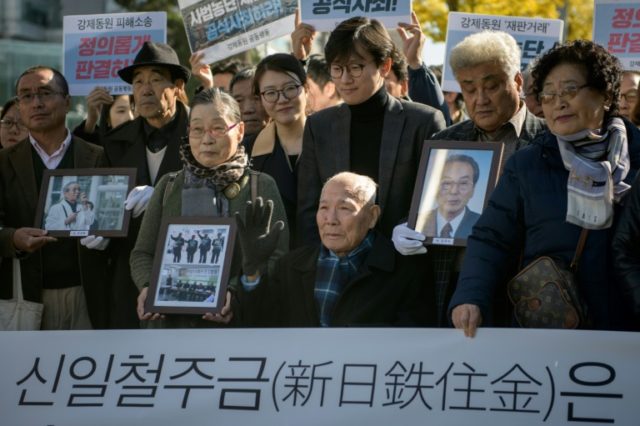Seoul (AFP) – South Korea’s top court on Tuesday ordered a Japanese steel giant to pay compensation over forced wartime labour, a decision likely to further strain ties between the two neighbours.
South Korea and Japan are both democracies and US allies faced with an increasingly assertive neighbour China and the long-running threat of nuclear-armed Pyongyang.
But their own relationship is soured by bitter disputes over history and territory stemming from Japan’s brutal 1910-45 colonial rule over the peninsula, with forced labour and wartime sexual slavery key examples.
Tuesday’s ruling marks the final South Korean chapter in a 21-year legal battle launched by four South Koreans — of whom only one remains alive — against Nippon Steel & Sumitomo Metal (NSSM), saying they were forced to work at its steel mills between 1941 and 1943.
The Supreme Court upheld a lower court ruling that each plaintiff be paid 100 million won ($88,000).
The sole surviving claimant, Lee Chun-sik, now in his mid-90s, attended the hearing in a wheelchair and was visibly overcome after the ruling.
“I’m just very sad that I am the only one remaining,” Lee told reporters, teary-eyed and choking.
Two South Koreans initially brought the case to a Japanese court in 1997, seeking payment for damages and unpaid wages for forced labour at steel mills owned by a predecessor company of Nippon Steel.
Japanese courts dismissed the case, saying their right to sue had been extinguished by the 1965 treaty.
But the victims — along with two others including Lee — launched a separate action in South Korea in 2005, and in 2012 the Supreme Court in Seoul ruled that the company was liable.
Tuesday’s decision dismissed NSSM’s final appeal over the amount of the award. No further appeals is possible in the South Korean courts.
Nippon Steel & Sumimoto Metal called the decision “deeply regrettable”, saying it went against the 1965 treaty which saw Seoul and Tokyo restore diplomatic relations, which included a reparations package of about $800 million in grants and cheap loans.
The firm said it will “carefully review the decision of the Supreme Court of Korea in considering its next steps, taking into account the Japanese government’s responses on this matter and other factors”.
According to official Seoul data, around 780,000 Koreans were conscripted into forced labour by Japan during the 35-year occupation, not including the women forced to work in wartime brothels.

COMMENTS
Please let us know if you're having issues with commenting.